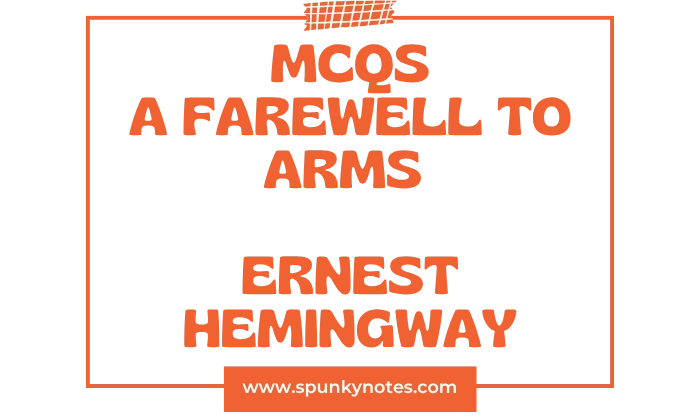

Estimated Reading Time: 19 min
A Farewell to Arms MCQs
1. Where did the narrator first live in the late summer of that year?
A. A house in Gorizia
B. A house in a village across the river
C. A bawdy house in Udine
D. A field hospital near Plava
2. What came with the start of winter that caused many deaths?
A. Heavy snow
B. Shelling
C. Permanent rain and cholera
D. The German offensive
3. What is the narrator’s job in the Italian army?
A. Artillery spotter
B. Infantry officer
C. Ambulance driver/Lieutenant
D. Surgeon’s assistant
4. Where did the narrator first go to meet Catherine Barkley?
A. The bawdy house for officers
B. Rinaldi’s mess hall
C. The British hospital garden
D. A café in Udine
5. What object did Catherine Barkley carry that reminded her of her dead fiancé?
A. A lock of hair
B. A thin rattan stick
C. A silver locket
D. A small Bible
6. What Italian area did the priest initially want the narrator to visit on leave?
A. Naples
B. Palermo
C. Abruzzi
D. Florence
7. What type of shell wounded the narrator and killed his driver Passini?
A. High explosive
B. Shrapnel
C. Trench mortar shell
D. Naval gun
8. Where exactly was the narrator when he was severely wounded?
A. Crossing a bridge
B. In a field hospital
C. Sitting in a dugout, eating
D. Driving an ambulance
9. What did the driver, Passini, repeatedly shout after he was hit?
A. The war is finished!
B. My sister! My sister!
C. Mama Mia! and begged to be shot
D. Viva l’esercito!
10. What medal was the narrator proposed for, according to Rinaldi?
A. The Iron Cross
B. The silver medal of valor
C. The gold medal of honor
D. The bronze star
11. What did the priest bring the wounded narrator at the field hospital?
A. A book and fruit
B. Mosquito netting, vermouth, and papers
C. Spaghetti and wine
D. A new uniform and gloves
12. What was the first difficulty the narrator faced upon arriving at the American hospital in Milan?
A. No available doctors
B. The lack of clean beds
C. The stretcher wouldn’t fit in the elevator
D. The nurses spoke no Italian
13. What did the élderly night nurse, Mrs. Walker, do when the narrator arrived?
A. Took his pulse
B. Checked his wounds
C. Started to cry
D. Immediately called the doctor
14. What misunderstanding caused the barber to be extremely cautious while shaving the narrator?
A. The narrator refused to pay
B. He thought the narrator was an Austrian officer
C. He was secretly an anarchist
D. He was afraid of blood
15. Which doctor refused to operate on the narrator’s knee immediately, advising a six-month wait?
A. Dr. Valentini
B. The house doctor
C. The bearded first captain
D. The X-ray specialist
16. What was the final, successful surgeon’s profession and rank?
A. Captain, General Surgeon
B. Lieutenant, Orthopedist
C. Major, Surgeon
D. Colonel, Internal Medicine
17. What did Catherine confess to the narrator when they were first alone in Milan?
A. She had decided to leave the hospital
B. She was too scared of the fighting
C. She was three months pregnant
D. She wanted to get married immediately
18. What natural element did Catherine confess she was afraid of?
A. High winds
B. Earthquakes
C. The rain
D. Fire
19. What did the narrator lie about to Catherine while they were talking on the bench?
A. His military rank
B. Saying “I love you”
C. His feelings about the war
D. His friendship with Rinaldi
20. What did the narrator and Catherine name the horse they backed that won but paid poorly?
A. Light For Me
B. Black Pig
C. Japalac
D. Franz Joseph
21. What was Catherine Barkley’s formal hospital designation?
A. Registered Nurse
B. Civilian Aide
C. V. A. D.
D. Surgical Assistant
22. What character visited the hospital and brought gifts for the “dear boys”?
A. Helen Ferguson
B. Miss Van Campen
C. Mrs. Meyers
D. Rinaldi’s mother
23. What accusation did Miss Van Campen make about the cause of the narrator’s jaundice?
A. Poor sanitary conditions
B. Contagion from a patient
C. Alcoholism/drinking too much brandy
D. Exposure to cold
24. What was the result of Miss Van Campen finding the bottles?
A. The narrator was promoted
B. Catherine was sent away
C. The narrator lost his three-week leave
D. Rinaldi was reprimanded
25. What did Rinaldi say was killing him when the narrator returned from Milan?
A. His failed novel
B. The war and depression
C. The lack of girls
D. His hand shaking
26. When the narrator returned to the front, what did the priest say was causing many people to feel gentler?
A. The approaching peace
B. The army had been beaten
C. Increased faith in God
D. The end of winter
27. What was the Major’s primary feeling when the narrator returned to the front?
A. Optimistic about the offensive
B. Tired and done with the war
C. Angry at the lack of supplies
D. Excited for his decoration
28. Where was the narrator sent to take command of ambulance cars upon his return?
A. Gorizia
B. The Bainsizza plateau
C. The Carso
D. Caporetto
29. On the Bainsizza, what did Gino, the driver, complain was short, hurting the soldiers’ morale?
A. Ammunition
B. Uniforms
C. Water
D. Food
30. What characteristic did the narrator ascribe to abstract words like “glory,” “honor,” and “sacrifice”?
A. Uplifting
B. Obscene
C. Necessary
D. Forgotten
31. What did the narrator observe about the retreat once it began?
A. It was swift and quiet
B. It was highly disorganized
C. It was orderly, wet, and sullen
D. It was marked by celebrations
32. What group did the narrator see being loaded onto a truck as they passed through Gorizia?
A. Wounded officers
B. Captured Germans
C. Girls from the bawdy house
D. British nurses
33. Who was Aymo giving a ride to when the narrator found his car stalled?
A. A pair of engineers
B. Two young girls/virgins
C. Joseph Grand
D. A wounded major
34. What did Bonello kill and why?
A. A German sniper, for revenge
B. An Italian sergeant, because he was an anarchist
C. A cat, for fun
D. A sick horse, out of mercy
35. What military vehicle was first spotted by the narrator crossing an upstream bridge?
A. An armored personnel carrier
B. An artillery truck
C. A yellow mud-colored staff car
D. A motorcycle convoy
36. What group fatally shot Aymo after the first German sighting?
A. German bicycle troops
B. Italian rear-guard/battle police
C. Austrian snipers
D. German staff officers
37. What did Bonello choose to do rather than continue the retreat with the others?
A. Find another car
B. Be taken prisoner
C. Try to swim the river
D. Return to Gorizia
38. When the battle police began executing officers, how did the narrator escape?
A. He fought the guards
B. He ducked and jumped into the river
C. He showed his fake papers
D. He hid in a truck
39. Where did the narrator feel his obligation to the army ended?
A. When Aymo died
B. When he was wounded
C. When the carabiniere grabbed his collar
D. When he saw the German car
40. What type of war material was the narrator hiding among on the flat-car heading toward Mestre?
A. Ammunition boxes
B. Trench mortars
C. Guns/artillery
D. Medical supplies
41. When the narrator went to Milan in civilian clothes, what did his friend Simmons offer him?
A. Money for the train
B. His own civilian clothing
C. A place to stay in Rome
D. Help getting a fake passport
42. Where did the narrator tell the hotel manager in Stresa he was going?
A. Back to the front
B. To Rome to see family
C. To meet his wife
D. To start a new job
43. When Ferguson saw the couple together in Stresa, what emotion did she display?
A. Jealousy and relief
B. Anger and violent crying
C. Immediate happiness
D. Pity for the narrator
44. What poem did the narrator quote in the hotel room that Catherine identified?
A. Othello
B. The Plague
C. Time’s winged chariot hurrying near
D. If winter comes…
45. How did the narrator and Catherine travel from Stresa to Switzerland?
A. By train over the mountains
B. They walked across a border post
C. In a rowboat across the lake
D. In a stolen ambulance
46. What object did the narrator use to drink icy water during the escape across the lake?
A. A champagne glass
B. The tin pail used for bailing
C. A leather canteen
D. A boot
47. How did the narrator feel upon stepping onto the Swiss quay in Brissago?
A. Terrified of arrest
B. A sense of exhilaration/grand feeling
C. Deep remorse
D. Immediate hunger
48. Why were the Swiss custom officials in Locarno polite to the couple?
A. They were Americans
B. The couple had money and valid passports
C. The war was confusing
D. They were sympathetic to desertion
49. Where did the couple live for the final months of Catherine’s pregnancy?
A. Milan, at the hotel
B. Geneva, near the lake
C. A brown wooden house on a mountain near Montreux
D. Locarno, in a rented villa
50. What was the immediate cause of death for Catherine’s baby boy?
A. Infection
B. The cord was wrapped around his neck
C. High fever
D. Difficulty breathing
Brief Overview
The novel, by Ernest Hemingway, is set during World War I. Frederic Henry, an American, is an ambulance driver in the Italian army. He lives near the front line in Italy.
Henry meets Catherine Barkley, a British nurse. Her fiancé died in the war, and she is mourning. Henry and Catherine begin a relationship in the garden of the British hospital.
Henry is badly wounded by a trench mortar shell while eating. He is sent to a hospital in Milan to recover. Catherine joins him there. While in Milan, they fall deeply in love. Catherine tells Henry she is pregnant.
Henry returns to the front later that fall. The Italian army suffers a massive defeat and retreats. During the chaos, military police execute officers. Henry deserts the army to avoid being shot. He floats down a river to escape.
Henry and Catherine reunite in Stresa. They row across a lake to Switzerland to escape arrest. They live happily in the mountains while waiting for the baby.
In Lausanne, Catherine begins labour. She has been in pain for many hours. The doctor performs a Caesarean operation. The baby boy is stillborn. Catherine suffers haemorrhages and dies. Henry is left alone.


